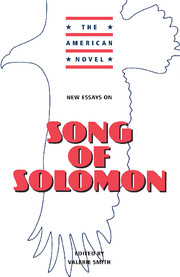Book contents
- Frontmatter
- Contents
- Series Editor's Preface
- 1 Introduction
- 2 From Orality to Literacy: Oral Memory in Toni Morrison's Song of Solomon
- 3 Call and Response: Voice, Community, and Dialogic Structures in Toni Morrison's Song of Solomon
- 4 Knowing Their Names: Toni Morrison's Song of Solomon
- 5 The Postmodernist Rag: Political Identity and the Vernacular in Song of Solomon
- Notes on Contributors
- Selected Bibliography
5 - The Postmodernist Rag: Political Identity and the Vernacular in Song of Solomon
Published online by Cambridge University Press: 06 July 2010
- Frontmatter
- Contents
- Series Editor's Preface
- 1 Introduction
- 2 From Orality to Literacy: Oral Memory in Toni Morrison's Song of Solomon
- 3 Call and Response: Voice, Community, and Dialogic Structures in Toni Morrison's Song of Solomon
- 4 Knowing Their Names: Toni Morrison's Song of Solomon
- 5 The Postmodernist Rag: Political Identity and the Vernacular in Song of Solomon
- Notes on Contributors
- Selected Bibliography
Summary
SONG of Solomon (hereafter Song) is a postmodernist text. But its postmodernism is specifically structured by the subversive dynamics of black American vernacular Signifyin(g) (hereafter just “signifying”) and the relation of that signifying to techniques of postmodernist indeterminacy, fragmentation, pastiche, and irony. It explores the political complexities of personal, racial, gender, and group identification; the language obliquely plays – “signifies” – on the uselessness of essentialist constructions of identity while it dramatizes the empowering effect of flexible and unstable constructions of the self.
I evoke postmodernism as background for my reading of Song precisely because the conflicted debates over the definitions and politics of postmodernism offer an interesting context for considering vernacularity and its relation to history and textual manipulations. And I begin here by raising the issues that motivated my interest in such a reading of this text. If vernacular signifying, as various studies and theories argue, constantly creates and recreates narratives undermining predictable, normative, prescriptive, or commonsense notions of meaning and reality, what might be its effect on the ways in which a character is constructed in a black American fictional text? If the characteristics of signifying are analogous to the characteristics of postmodernism, and we accept the possibilities of signifying as political (given the relation between the linguistic “play” of a marginalized group and the dominant group's dialect – standard English), what might that suggest about postmodernism deployed as literary technique(s) and/or engaged in as critical discourse? What makes Song a fascinating proving ground for these ideas? And finally, how might thinking about these things illuminate a reading of the novel for students, literary critics, and those interested in political interventions in hegemonic literary discourse?
- Type
- Chapter
- Information
- New Essays on Song of Solomon , pp. 93 - 116Publisher: Cambridge University PressPrint publication year: 1995
- 4
- Cited by

